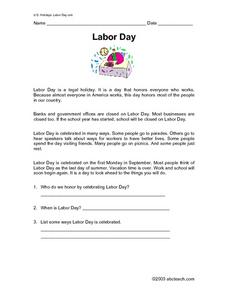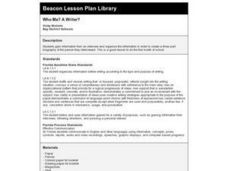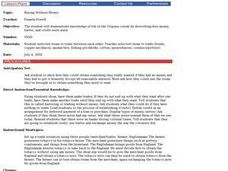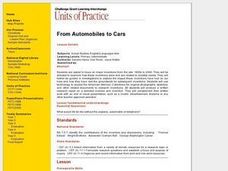Curated OER
Chancing it
Seventh graders examine different transplant types and estimate the possible outcomes. In this biology lesson plan students discuss donors and transplants then divide into groups and complete a worksheet.
Curated OER
The U.S. Constitution: Practical Application of the Amendments
Students create their own HyperStudio cards which include scanned images of at least one member (designated reader) of each group. They add the text of a predetermined amendment. The designated reader then reads the selected amendment.
Curated OER
Labor Day
Students examine the events which led to the observance of Labor Day as a national holiday, and analyze the role of labor unions in American history, past and present, through a variety of activities.
Curated OER
Four Dollars and Fifty Cents
Students use the book, Four Dollars and Fifty Cents, to discover ways that creditors can obtain payment from reluctant debtors
Curated OER
Who Me? A Writer?
Students interview another student using a twenty question format and write a three-part biography of that person. They create a collage representing the person they interviewed.
Curated OER
Digging Deeper: Mission San Sabá
Seventh graders view a painting of the destruction of Mission San Saba in Texas. They discuss the painting and identify information that they can infer from the painting.
Curated OER
Artifact Ethics
Fourth graders examine their own values and beliefs about archaeological site protection and evaluate possible actions they might take regarding site and artifact protection.
Curated OER
The Role of the Media
Students analyze the role of media in the Gulf War after watching a video series. They participate in a small group simulating a specific group from the film. They discuss issues with their group and then participate in a whole class...
Curated OER
Acid and Bases - Alien II
Eighth graders determine which of two solutions is more acidic by adding each to a given base. Students have to apply this analysis process to a problem scenario involving an alien creature.
Curated OER
Acid Precipitation
Students test the acidity of unknown solutions. They use this information to make inferences from data given from recorded rainfall records to identify areas that receive the most acid rain.
Curated OER
Buying Without Money
Students describe life in the Virginia colony. They explain how money, barter, and credit were used. Students simulate trading items among classmates. Students compare/contrast credit and trade.
Curated OER
Murder in Ha-Tien: The Concept of Justice in Chinese Society
Eleventh graders become aware of alternative perceptions of reality. They analyze the concept of justice by showing it in an unfamiliar socio- cultural context, inviting comparison. They practice reading comprehension.
Curated OER
Peer Pressure
Young scholars investigate sources and effects of negative peer pressure and learn skills to deal with it. They complete a worksheet.
Curated OER
The Truth About Triangles and Squares
Fourth graders investigate the patterns associated with both triangular and square numbers. They use counters as manipulatives to depict the numbers as needed but focus on problem solving using mental math techniques.
Curated OER
Real People, Real Farms - Case Studies
Learners study examples of sustainable farms. In this case study lesson students study real cases of farms to gain information.
Curated OER
Yard Sale
Students complete activities to discover spending, goods, services, price, advertising, choice, alternatives, criteria and opportunity cost.
Curated OER
Mississippi Under British Rule
Pupils construct appropriate maps to depict the following information: changes in European territorial claims as a result of the French and Indian War; boundaries of British East and West Florida; significant rivers and settlements of...
Curated OER
Zhuang: China's Largest Minority
Students, in groups, research Chinese ethnic minorities such as the Zhuang population. They identify the characteristics of different ethnic groups and consider the lives of ethnic groups worldwide.
Curated OER
Working With Parents
Student teachers learn the importance of understanding the family dynamics of their pupils to effectively communicate academic and behavioral concerns.
Curated OER
Working for What You Want
Second graders write a story about someone who works in order to earn money for something they want.
Curated OER
From Automobiles to Cars
Pupils research important inventions from the last two hundred years. They explore how one invention relates to another and summarize their research in a written report and visual presentation.
Curated OER
"it's All in the Cellar"
Seventh graders examine the process of constructing a site plan map at archaeological sites. They discuss the process of mapping techniques and calculation of percentages, create a plan site map of a cellar at Jamestown, and calculate...
Curated OER
SLC ordinances from the 1860's get students involved in
Eleventh graders discuss Salt Lake City ordinances from the early 1860's, which leads to drafting ordinances to present to local government.
Curated OER
It's in the Garbage
Students analyze how studying garbage relates to methods of archaeology. They examine garbage to determine things about their culture and relate that to prehistoric peoples.

























